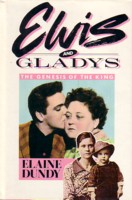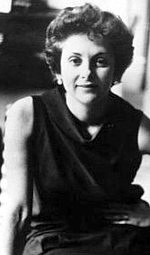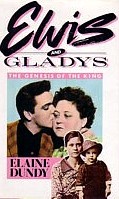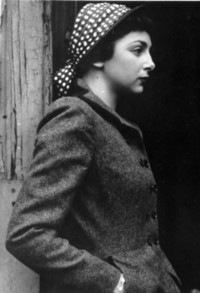

Interview: Elaine Dundy, celebrated author of the seminal book, 'Elvis & Gladys: Genesis of The King", talks to EIN
Elaine's other literary works include the best seller, "The Dud Avocado", "The Old Man and Me", "The Injured Party", "Finch, Bloody Finch" (an acclaimed biography of actor, Peter Finch) and her fascinating autobiography (soon to be a film), "Life Itself!" In the first part of her fascinating interview with EIN from 2004, Elaine looks back on her own life, discussing her famous novel, "The Dud Avocado", time spent with "friends" like Ernest Hemmingway, Tennesse Williams, Marilyn Monroe and Marlene Dietrich, how she came to write "Elvis and Gladys" and the often unflattering way Elvis is presented in the media.
EIN
- Elaine, thank you for taking time to talk with us today. Your
life has been so full of fascinating characters. Can we start by
asking you where you were born & what decided you to move to Paris
& becoming an actor?
Elaine Dundy: I was born into a prosperous Jewish family in
the 1920s. I grew up on Park Avenue in New York. Always an inspiration
to me was my amiable maternal grandfather, Heyman Rosenberg, a turn
of the century engineering genius whose revolutionary screws fastened
together two of America's best loved landmarks: Lindbergh's Spirit
of St. Louis and the Statue of Liberty's crumbling drapes.
In many ways mine was a privileged childhood. But wealth,
luxury and opportunity were counter-balanced by fear, unhappiness
and repression. I loved school but coming home every day was like
returning to prison with my father the sadistic warden, we three
sisters the inmates and my mother the snitch. My father was a hard
working businessman, hard hit by the Depression. As opposed to my
amiable grandfather, he was a rageaholic given to violent fits of
temper at the dinner table which could land on any of us. He lost
a fortune in the Wall Street Crash in '29 but eventually was able
to make another. A wealthy successful businessman, an active philanthropist,
in his own home he was a tyrant; a frightening, damaging and destructive
father.
Every night through my teens I nurtured fantasies of
killing him. After a stint in wartime Washington, I became an actress
and moved to Paris where the chances of furthering my career looked
good and where I could escape from the family situation.
EIN: After moving on from your career as an actor, your first novel "The Dud Avocado" was one of your greatest successes. We believe that it has been optioned to be made into a film. Are you working on the screenplay and is the film in production? E.D.: Yes, the Dud Avocado has been optioned but nothing finalized. The wheels of fate grind slow. No, I am not interested in working on a screenplay, and no, it is not yet in production. The question that I am always asked is: "How autobiographical is the novel?" My answer: "All the outrageous things my heroine does like wearing an evening dress in the middle of the day are autobiographical. All the sensible things she does are not." And also I am asked: "Why after all these years has it never been out of print?" I believe I was lucky with Paris as the background. Paris never gets a bad press. Also, it was in a well known literary tradition of the American abroad but after Edith Wharton, Henry James, etc. all writing in the third person, I gave the novel a first person so you know first hand what the heroine is thinking. EIN: You work as an author has been fabulously varied. Novels, biographies (Including Elvis & Peter Finch) as well as an autobiography. What book are you most proud of?E.D.: Well, that could be a hard question because it is not a horse race and I enjoyed doing most of them. I think in Elvis and Gladys my reach was most ambitious and I think I am most proud of it. EIN: You once said that, "Prior to 1977, I didn't know that Elvis was alive until he died". Can you, explain how for such a gregarious woman of the fifties, Elvis hadn't made such an impact on you?
EIN: You have also always argued against the 50s era being described as "Dull Conformity" yet surely the rock 'n' roll music & teenage youth explosion of that decade was perhaps the most important rallying call against the post war conformity? E.D.: No, my dear-each to his own. My musical explosion was decades before in the jitterbug. Is this answer accepted? EIN: You started your early career as an actress & studied at drama school with future stars like Tony Curtis & Rod Steiger amongst others. Elvis stated that his ambition was to be a successful serious actor. Do you think that Elvis missed his opportunity to become a great actor by not finding time to go to Drama school? E.D.: Yes, of course he did not get any actor's training. And I'm still trying to find out why he didn't get coaching when huge stars such as Brando and Newman did and Montgomery Clift even had his own coach on set on all of his films. Important digression: So many legends and religions bump into each other in Elvis' story: Orpheus torn to pieces by the Maenads; the Divine Right of Kings; Judaic and Christian dealings with the Devil. Jesus, tempted by Satan resists with a "get thee hence." Dr. Faustus, said to be Jewish origin, makes his pact with the Devil and ends in hell. Early on Elvis meets Colonel Parker and signs a contract which binds him to the diabolical Dutchman for the rest of his life. Incidentally, I find myself blaming everything Elvis should have done and didn't on the Colonel Parker's pernicious influence Behind Elvis there was another great legend: the metaphysical world of double identity comic book heroes. Elvis' favorite was Captain Marvel Jr., who looks, in fact, exactly like Elvis will make himself look for the rest of his life. Marvel Junior is the most powerful boy in the world. The other identity being the reality of poor, Freddy Freeman but both go about saving the world. EIN: Elaine, your life has been full of so many famous people, Laurence Olivier, Vivien Leigh, Hemmingway etc. We found it extraordinary to discover that Marlene Deitrich once offered to baby-sit for you! How did that come about? E.D.: Deitrich had been monopolizing my husband, Kenneth Tynan, the theater critic, seeking advice during her stint at the Café de Paris. Perhaps she thought babysitting our new baby would mollify me. I'd already found new friends. EIN: And please share with us the story about the time you arranged a party for Marilyn Monroe. E.D.: We had invited Marilyn Monroe and her then husband, Arthur Miller, and select others to dine with us at our flat in Mount Street. Starting an hour before, Miller rang to inform us of Marilyn's well-being. First, she was hysterical but he would be coming. Then, they were both coming. Then, she was hysterical and he could not come, and so forth. At which point, Ken said: "Now my wife is hysterical!" Ken thought to cancel dinner with our selected guests. I said: "No - they are all in theater and used to last minute disasters." In fact, we all had a wonderful time-John Osborne and his wife, Mary Ure, director Peter Hall and his wife Leslie Caron, among others. Like kids out of school, we all had a wonderful time. EIN: You were friends with both American authors Ernest Hemmingway & Tennessee Williams (& boy, am I jealous!) Both of them shared similar traits to Elvis in that they found it hard to deal with stardom. Leading to numerous hospitalisations, increased pill abuse, and poor physical health. Do you feel that this was just due to the pressures of fame or the fact that all their individual stars shone so bright that inevitably they burnt out too quickly? (EIN comment: How extraordinary that all three of them also appear on US postage stamps!)
E.D.: I never thought of including Elvis with Tennessee
and Hemingway but yes, they all found it difficult to stay in the
limelight, which at the same time they couldn't give up. It needs
to be pointed out that both Hemingway and Tennessee stayed the course
much longer than Elvis. As to pill abuse, listen: so many people
got involved with it because it was THERE and none of us I think,
including the doctors, knew the harm it would do. (See the seminal
work on pill problem in sixties in VALLEY OF THE DOLLS. Now we have
rehabs.) Yes, it is extraordinary that all three of these singularly
gifted men became U.S. postage stamps. Ironic it thereby conveyed
upon them what all their fame and notoriety could not-respectability.
EIN: Hemmingway is also similar to Elvis in that he liked to be surrounded by sycophantic admirers and seemed to need or crave it. Both also had domineering Mothers in their lives. Is this coincidence or do you think it goes deeper than that? E.D.: Elvis may have been the first movie star to have that kind of entourage, but bullfighters and prizefighters do and so in fact does Bruce Springstein. Mothers, by the way, are a Southern Thing and when Elvis was asked about loving his mother so much, he replied: "Doesn't everyone?" EIN: They are a lot of further Elvis parallels between your friendship with both Hemmingway & Tennessee Williams. Actor Nick Adams was friends of both and you also spent time sailing on Producer Hal Wallis' yacht. (Mr Wallis of course produced nine Elvis films including King Creole & Blue Hawaii). Do you remember ever discussing Elvis at the time with either of them? E.D.: You misread. I was never on Wallis' yacht. EIN: Your book 'Elvis and Gladys: The Genesis of The King' has been noted for being "Nothing less than the best Elvis book yet". That is amazing praise for a book about a man who has already had thousands of books printed about him! What made you decide to investigate Elvis' early years and the importance of his mother? E.D.: I was reading all the Elvis books that were coming out. I retained all the information and misinformation. I found my curiosity becoming insatiable and perceived it becoming professional. Step by step, I was following a process that would lead me to write the biography. I was looking for the source of the Nile. I spent months in Tupelo, Elvis's birthplace where he lived for his first thirteen years. His important relationship with his mother was well known but I concentrated on his maternal line to find out where Gladys had come from. I learned many fascinating things such as his Great-great-great grandmother being a full-blooded Cherokee, Mourning Dove. Through many interviews with Tupeloans, Gladys' personality came to vivid life. Though brought up on the edge of poverty, she nevertheless as a beautiful sixteen year old, danced a wild and memorable Charleston, and was called "Clara Bow" because she had It. "Elvis got it honest," they said remembering Gladys' gyrations, "Gladys had rhythm." EIN: In 'Elvis and Gladys' you touch several "nerves" within the Elvis world. One is the way Elvis was and continues to be presented in the media as a relatively uneducated, simple country person. Despite many authors after yourself challenging that perception there has been little change in the media's portrayal of Elvis. Why do you think this is so? E.D.: He was such a cultural explosion, such a wild sexual force, the only way they could deal with it was to present him as dumb. That meant he had his limits; that meant he would soon go away. Sinatra spoke for the mothers and fathers of the anti-Rock-n-Roll generation by stating to a French magazine (of all places): "Rock and roll is the most brutal, ugly, degenerate, vicious form of expression-sly, lewd-in plain fact, dirty-a rancid-smelling aphrodisiac and the martial music of every sideburned delinquent on the face of the earth." Later after Elvis was released from the army, Sinatra would sing duets with him on a TV program and was suitably impressed. Elvis growing up joined everything Tupelo had to offer a young boy that was free. At thirteen, he was one of he very few young boys who joined the Lee County Library. NB: See photograph in latest University of Mississippi reissue of ELVIS & GLADYS. Note also, how many activities he joined in Memphis Humes High School yearbook. In part 2 of our interview with Elaine Dundy (to be published next week), Elaine discusses Elvis' personality, his film career, her autobiography, Life Itself!, and the reprint of Elvis and Gladys. EIN wishes to thank Joan Gansky for her help in arranging this interview. Click to go to Part 2 of this interview Click to comment on this interview Click here for Roy Turner, Elvis historian, talking about Elvis In Tupelo: Roy Turner is an Elvis Historian who is well-known in the Elvis world for his amazing research into this all-important period of Elvis' past. He was the major source of research behind Elaine Dundy's book 'Elvis and Gladys', has been involved in multiple Elvis projects and was the author of the recent MRS book 'Tupelo's Own; Elvis Presley'. EIN Website content © Copyright the Elvis Information Network.
Elvis Presley, Elvis and Graceland are trademarks of Elvis Presley Enterprises. The Elvis Information Network has been running since 1986 and is an EPE officially recognised Elvis fan club.
|













